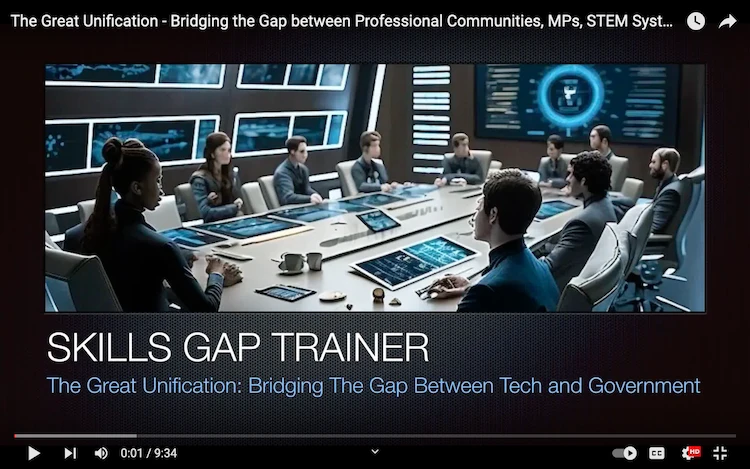Video: The Great Unification – Bridging the Gap between Professional Communities, MPS, STEM Syst…
YouTube Link: https://youtu.be/JxAm-Twhr8E
Because Instead of ‘The Great Reset,’ We Need ‘The Great Unification’ 🙂
Video: Bring It Home Rally in Woodstock
YouTube Link: https://youtu.be/paoQD5PLaWY
The Great Unification
The landscape of Canadian society is beautifully diverse, comprised of numerous professional communities contributing to the nation’s social, economic, and cultural richness. It is within this diversity that Pierre Poilievre seeks to forge a united, prosperous Canada. His vision is a tapestry where every thread is significant, a country that honours each community’s expertise, and respects their freedoms and rights. As a cheeky aside, we suggest that instead of the World Economic Forum’s “Great Reset,” what we really need is a Canadian “Great Unification”.
Rural Canadians Currently At Risk
Under the current administration, certain policies have raised eyebrows within groups such as rural Canadians, farmers, hunters, sports shooters, energy workers, mining workers in the prairie provinces, and responsible firearm owners. These policies, especially in regards to gun control, disproportionately impact these communities. These professionals, through their lived experiences and accumulated wisdom, provide invaluable insights. Their perspectives are key in crafting policies that respect their rights and the diverse ways of life that make Canada a pluralistic nation.
Male Workers At Risk
Moreover, it’s argued that certain legislations negatively impact industries typically associated with male workers, such as resource extraction. This restriction places strain on the workers’ ability to provide for their families, leading to economic and societal imbalance. Poilievre’s vision seeks to bridge this divide, addressing the concerns of these professional communities, and working towards policies that uphold their rights and ensure their economic prosperity.
Religious Communities At Risk
Respect for diverse perspectives also extends to religious communities, such as evangelicals. Regardless of personal beliefs, their understanding of ethics, history, and the moral struggle between good and evil can offer rich insights for a balanced, inclusive society. Their wisdom can help guard against oppressive tendencies and promote a healthy societal discourse.
Family Futures At Risk
Women, an integral part of these professional communities, also feel the impact of these policies. Policies affecting public safety, national security, family safety, entrepreneurship, and work ethics are also their concern. They too stand to benefit from policies that protect and uplift all community members.
Savings Culture Works
Pierre Poilievre’s vision, however, extends beyond addressing these immediate concerns. It encompasses larger structural reforms to tackle economic instability, excessive government expenditure, and ineffective taxation. This includes the institution of a ‘dollar for dollar’ law, which mandates every new dollar of government spending to be balanced with a dollar of savings, fostering fiscal responsibility.
Energy Independence Works
Beyond these, Poilievre recognizes the need for energy independence. He advocates for increased local extraction and refinement to reduce reliance on foreign oil, and even suggests the production of our own lithium for electric car batteries, currently stifled by bureaucratic red tape.
Professional Standards Work
By addressing immigration issues, like the difficulties immigrant healthcare workers face due to qualification recognition issues, Poilievre proposes a “Blue Seal” standard. And to combat the housing crisis, he suggests incentives to encourage city governments to build more homes.
STEM Works
At the heart of these policy propositions lie the principles of Science, Technology, Engineering, and Mathematics (STEM). These disciplines are built upon innovation, problem-solving, and a forward-thinking mindset. They are intrinsically linked to Poilievre’s vision of a prosperous, united Canada. By integrating STEM principles into policy-making, we’re able to bridge the gap between corporate giants, small businesses, individual innovators, and the government.
For instance, data analytics, a staple in STEM, can guide equitable tax reforms. Environmental science can inform sustainable energy production policies, while digital platforms can streamline bureaucratic processes. This includes immigration processes and housing policies, leading to an effective, efficient government.
“The Great Unification” powered by “The Great Human-AI Alignment“
In conclusion, by aligning the principles of STEM and modern 21st century level STEM systems, the exponentially increasing capabilities of AI, the legislative insight of the MPs, and Poilievre’s vision, we are able to create an inclusive, prosperous, balanced, efficient, and rapidly rising 21st century Canadian technology powerhouse. This helps us bridge the gap between our diverse professional communities, the Conservative Party, 21st century STEM systems, and AI technologies to enable our diverse professional communities to achieve and contribute a higher level of productivity and progress. And in this process, we enable the iterative evolution of an efficient digitally driven and AI augmented governance structure fit for the 21st century. This, ladies and gentlemen, is our ‘Great Unification’ proposal to every great and epic existential challenge humanity faces over the next 50 years, including even tiny ones such as the ’20th century Canadian gatekeepers’, ‘The Great Reset’, ‘Russia/Ukraine War’ and the ‘CCP’, as well as any other foreign subversion or influence attempt.
Our comments on YouTube:
Comment: “Achieving Real Inclusivity by Balancing Diversity and Meritocracy in Hiring Policies – In the context of hiring policies, we must acknowledge the importance of meritocracy, which means hiring individuals based on their qualifications, skills & experience, rather than solely on their identity. Overemphasis on identity politics can undermine the principle of meritocracy & may lead to unfair treatment of candidates who are more qualified but do not fit the desired identity profile. Striking the right balance between promoting diversity & ensuring meritocracy is critical for fostering a fair & inclusive society.”
Comment: “Finding A Balance: Fighting Legislation to Protect Freedom of Speech, Public Safety & Citizens’ Rights – In the face of the current resource development reduction legislation, housing development reduction legislation, firearm ban legislation, current and future censorship regulation bills, journalism regulation bills and speech regulation bills upcoming, we need to find a balance between protecting freedom of speech, public safety, & the rights & values of all citizens. Freedom of speech is a fundamental right in a democratic society, & limiting it can have far-reaching consequences. .
In the face of adversity, we have a choice: to rise above apathy & fight for our rights and freedoms, or to succumb to the crushing weight of oppression. Throughout history, individuals have made the choice to live, to heal, & to rebuild themselves as leaders in society, driving civil rights movements, inspiring powerful stories, & igniting progress that spans centuries.
However, as humanity faces new challenges brought on by the increasing power of politicians, CEOs, and international “I want to own everything and everyone” partnerships, we must recognize the urgency of the situation. With the advancement of technology, the foreign influencers are closer than ever to gaining complete control over the hearts and minds of some of our leaders and of regular Canadians with technology & neural interfaces, potentially stifling human potential & the emergence of new leaders and new intellectuals.
We must remember the lessons from past warriors, journalists & political prisoners who chose to persevere in the face of adversity & it was precisely this kind of journey of rebirth, that actually led to individuals to become warriors and to form resilience, growth and progress for all. They transformed themselves from timid & crushed individuals into beacons of hope & progress for their communities.”
Related books and resources:
“The Third Pillar: How Markets and the State Leave the Community Behind” by Raghuram Rajan: This book explores the critical role of communities in a balanced society, highlighting the importance of strengthening local communities alongside markets and states for sustainable economic and social wellness.
“Team of Teams: New Rules of Engagement for a Complex World” by General Stanley McChrystal: An exploration of leadership, team building, and organizational change that mirrors the collaborative spirit necessary for “The Great Unification”, focusing on adaptability and the breaking down of siloed structures, which is essential in integrating diverse professional communities.
“The Geography of Thought: How Asians and Westerners Think Differently…and Why” by Richard Nisbett: Provides insights into the diverse cognitive styles influenced by cultural contexts, supporting the notion of embracing diverse professional and community insights in policymaking and societal advancement.
“The Age of Surveillance Capitalism: The Fight for a Human Future at the New Frontier of Power” by Shoshana Zuboff: While discussing the challenges and ethical dilemmas posed by AI and big data, this book is crucial for understanding the stakes in aligning technology with human-centric values in governance.
“Enlightenment Now: The Case for Reason, Science, Humanism, and Progress” by Steven Pinker: Offers a perspective that aligns with the optimism of “The Great Unification”, advocating for the application of science, reason, and humanistic principles to solve societal issues.
“The Innovator’s Dilemma: When New Technologies Cause Great Firms to Fail” by Clayton M. Christensen: Essential for understanding the dynamics of innovation and disruption, supporting the STEM aspect of the proposed unification and the need for adaptability in traditional industries and governance.
“Bowling Alone: The Collapse and Revival of American Community” by Robert D. Putnam: Investigates the decline of social capital and community engagement in America, relevant to the discussion on bridging gaps between professional communities and fostering a united societal approach.
“AI Superpowers: China, Silicon Valley, and the New World Order” by Kai-Fu Lee: Discusses the global AI race and its implications, essential for understanding the role of AI technologies in future governance and societal structures as suggested in “The Great Unification”.
“The Righteous Mind: Why Good People Are Divided by Politics and Religion” by Jonathan Haidt: Offers insights into moral psychology, which is vital for addressing the challenges of integrating diverse professional and religious communities within a unified societal framework.
“Brave New Work: Are You Ready to Reinvent Your Organization?” by Aaron Dignan: Provides insights into innovative organizational structures and practices that could inform new governance models fitting for a digitally-driven and AI-augmented future.
To see our Donate Page, click https://skillsgaptrainer.com/donate
To see our Instagram Channel, click https://www.instagram.com/skillsgaptrainer/
To see some of our Udemy Courses, click SGT Udemy Page
To see our YouTube Channel, click https://www.youtube.com/@skillsgaptrainer

